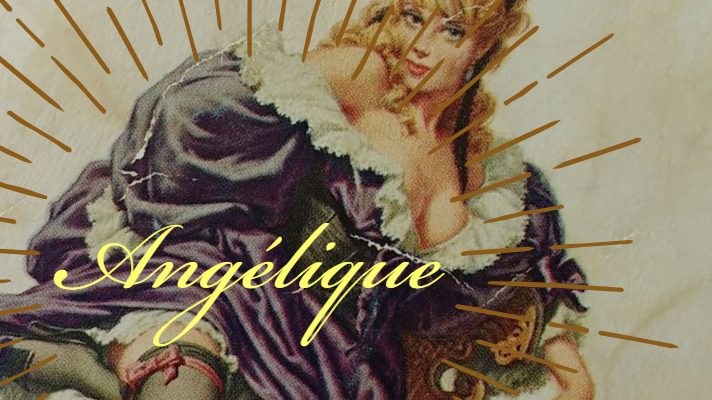Over 22 million Angélique books in print, says the cover of my 1975 Bantam Books’ edition of Anne Golon’s scandalous novel. Are things really sexier in France? Is Anne Golon’s Angélique a romance or have I been duped again by the confusion of “scandalously sexy” and “bodice ripper” with lay definitions of romance? Let’s see…
Book details:
Title: Angélique
Author: Anne or Sergeanne Golon
Original publication date: 1956
Setting time & place: Late 17th century France
He is… a Comte with hideous scars, a golden voice, and more gold than the King.
She is… the intelligent and beautiful 19 year old daughter of an impoverished baron.
Reasons to read this title: Passionate historical novelization of the reign of Louis XIV, the Sun King.
My review of Angélique
Is it a romance novel? No. There’s no HEA.
Is it a must read romance novel? Although I haven’t got to them yet, Angélique seems like an important precursor to the 1970s bodice-rippers, so if you’re interested in those…
I admit it, I judged Angélique by its covers. I was excited about it back in March, when I originally ordered the 8 book series on ebay. The books I got all have the sickly-sweet smell of tobacco permeating the pages, and “Delores [Surname]” written inside the cover. I imagine them sitting on a shelf in a shag-carpeted rec room until an estate sale, where some sharp-eyed buyer was quick to grab the whole set.
But Angelique was obviously marketed for her decolletage. pic.twitter.com/LnKRmKdAPX
— Romance MFA (@RomMFA) March 4, 2018
Anyway, as delightful as that is, let’s talk about what’s behind the amazing covers. As with all of my reviews, I’m giving spoilers straight up. In this case, I’m going to talk about the problematic elements of the novel first.
On the genre front, we can’t call it a romance. There’s not a happy ever after. Angelique falls in love, but she is separated from her hero and he is killed.
Then there’s the retrograde cultural elements that were maybe kinda okay in the 1950s but look pretty awful from 2018. First, rape but she liked it.
“If only I hadn’t felt so much pleasure!” she told herself over and over again, unable to stifle a recurring shiver of delight and terror.
🤮 Bleh.
Second, sexualization and infantilization of African characters.
The Negro, with his primitive power, was gauging his prey. He had sensed instinctively what this white woman, greedy for new pleasure, wanted of him. With half-open lips, Olympe de Soissons seemed utterly subjugated. Her dark eyes gleamed with an extraordinary fire. The throbbing of her lovely bosom, the avidity of her mouth betrayed her desire so shamelessly that even her maid lowered her head and Angélique felt like running away and slamming the door behind her.
🤮🤮 Double bleh. Is selling a Moorish slave to another aristocrat for sex a historically accurate thing? I don’t know–maybe? Is it what happens to the only black-skinned character in this book? Yes.
Before I got to the passages quoted above, I thought the novel was off to a promising start. We had a poor but spirited young lady sent off to be the wife of a mysterious and powerful man who has had many lovers, but is ready to settle down and win her heart. As the backmatter on my copy says,
Earthy, Barefoot Angélique is the daughter of a poor, provincial landowner. She ran wild with peasant boys and stable lads until the immensely rich and powerful Comte de Peyrac made her his wife. The Comte schooled Angélique in the ABC’s of loe. And soon, Angélique, the lusty peasant wench, was transformed in Angélique, the voluptuous queen of the Comte’s notorious Court of Passion.
This really makes it sounds like there are going to be orgies, doesn’t it? But take it with a grain of salt because Angélique’s father–who is poor, but also a baron of noble blood–gets involved in some business concerns in time to send his daughter to convent school before she can roll in the hay with her peasant boys, and she goes pretty directly from convent to marriage. As with many many romance novels, there is a prolonged courtship period between her marriage and her deflowering, and the whole “Court of Passion” thing is her husband’s attempt to revive a culture of “courtly love” in Toulouse. That’s the same sort of thing you may be familiar with in Arthurian legends – dudes worshipping lady-loves from afar, singing them love songs, killing ogres on their behalf, etc. I’m going to look more at courtly love in a future post.
Anyway, Angélique falls in love with her husband even though he is lame and has horrible scars on his face, because he treats her like a human being rather than a sex object, and also he talks to her about… science!
“You are a curious little woman. I believe you are beginning to become more tractable, but you haven’t ceased to surprise me. I’ve used all sorts of seductions to conquer the women I desired, but it never before occurred to me to make use of mathematics.”
This is a direct tie-in with the main plot of the novel, the part which is not romance-led. The Comte is a scientist, right at the time when Europe is struggling to differentiate between the mystical ideas of alchemy and the provable facts of what we now call chemistry. He married Angélique originally because her dowry was a mine, which produces little but makes an excellent cover for bringing Spanish gold and silver into France. The precious metals arrive as worthless looking slag, are melted down and the precious metals extracted, taxes are paid to the crown, the Comte gets richer, and everyone is happy except the Archbishop of Toulouse who doesn’t like a rich scientist being preeminent in his district.
This brings in a monk who is a hardcore believer in superstitious alchemy, and who cannot believe that the Comte isn’t producing all this gold without the help of the devil. Nor can he believe that Comte allows his wife to witness the mystical processes.
“But, Comte, you as a scientist know that a woman’s presence is in complete contradiction with the hermetic tradition according to which no results can be obtained among contrary fluids….”
“In my science, Father, results are invariably consistent and do not depend on the mood or quality of the persons present….”
Eventually the Archbishop and the monk escalate things up to the king, who is also feeling a bit jealous that this Southern Comte seems to have more gold than he does. Better than letting the Comte pay a portion of his wealth as taxes every year might be to seize all the assets, right? So pages 250-475 are the disappearance, trial, and ultimate death of Angélique’s husband, on account of his being a sorcerer.
(My copy continues for another 315 pages, which a skim shows covers her second lover and then second husband in three more parts. As it’s not really clear that this English-language edition corresponds exactly with the book divisions in the original French, and I’m particularly looking at the romance-or-not-romance question, I decided to quit reading after the death of her first hero.)
My official take on this novel is that it would almost be better categorized as historic science fiction. That may sound far-fetched, but main plot really hinges around the conflict of the medieval church and the modern science. It’s complicated by layers of court intrigue which I can see are going to play out in further books, but at the heart of the book is the question of “do we trust in science, or superstition?”
The answer seems self-evident to me (science all the way!) but it is also a theme which continues to plague contemporary society. Should we let ourselves be ruled by science, or the church? It’s also interesting that Golon links scientific methodology and methods of love in her story. The Comte, during his trial, answers questions about his Court of Love:
“I notice that these questions fascinate you, gentlemen of the court, just as they do less aged adolescents. Whether we be a schoolboy or a magistrate, don’t we all dream of conquering our lady-love? Alas, gentlemen, I fear I shall much disappoint you. I have no magic formula. What I teach is human wisdom. Thus, Monsieur le President, when as a young clerk you first set foot in these solemn precincts, did you not think it natural to instruct yourself in all that might some day enable you to reach the position that you occupy today? You would have considered it mad to mount the bench and start to speak without a prolonged study of your case. For many years to you took care to avoid all the obstacles that might rise in your path. Why should we not bring the same care to matters of love?”
So, like law school, but for love, which is a nice idea and could certainly be propagated widely. Let’s just leave out the parts where a few drops of Moorish blood give ladies a dusky hue and an insatiable appetite for male attention!



